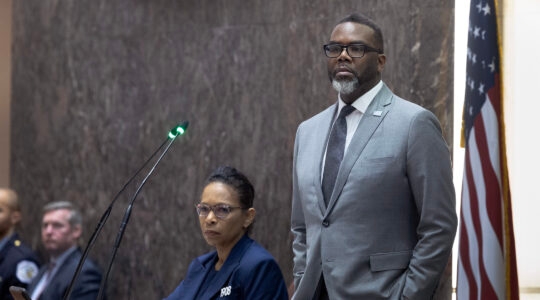(JTA) — The more that American Jews and Muslims interact with each other, the more likely they are to see the two faiths as more similar than different, a comprehensive study of Muslim-Jewish relations in America has found.
Fifty-four percent of Jews and 65 percent of Muslims surveyed in a poll for the Foundation of Ethnic Understanding responded that “Judaism and Islam are more similar to each other than they are different.” Jews who had frequent exposure to Muslims said Islam is more inclusive, more evolving and more modern than those who were exposed more infrequently.
The FFEU runs synagogue and mosque “twinning” programs and other interfaith activities for Jews and Muslims.
PSB Research on behalf of the FFEU conducted a national online survey of 1,000 respondents — 500 self-identified American Jews and 500 self-identified American Muslims — between January 9 and January 24, 2018. The study was sponsored by Ory Capital Partners.
The study, released on Wednesday, showed that the gaps between American Jews and Muslims were smaller than previously thought, and that the more devout the person was, the closer they aligned with the other religion.
The one issue where there was dramatic disagreement was over Jerusalem as the capital of Israel, with 48 percent of all Jews surveyed either strongly or somewhat supportive of Jerusalem being designated Israel’s capital and 63 percent of Muslims either strongly or somewhat opposed to it.
Both American Muslims and Jews acknowledge that there is anti-Muslim sentiment in the American Jewish community, with 55 percent of Jewish respondents surveyed saying that there is “some” and 9 percent saying there is “a lot” of anti-Muslim sentiment among Jews, and 44 percent of Muslims saying there is some and 17 percent saying there is a lot.
Some 63 percent of American Jews polled and 65 percent of Muslim Americans agreed that it is very important for the two groups to work together to strengthen laws to prevent discrimination.
On the topic of the Israel-Palestinian conflict, 44 percent of Jews and 48 percent of Muslims say that it is possible for a peaceful and mutually agreed upon solution to the conflict, with 39 percent of Jews and 21 percent of Muslims responding that this is impossible. The numbers that say it is possible increases in the subset of Jews and Muslims that have more frequent contact with each other.
“Muslim-Jewish relations are thought to be in conflict but this study shows that they are in a state of cooperation,” said FFEU President Rabbi Marc Schneier in a statement. “This is the first definitive study of its kind to quantify that with cooperation and dialogue between the two groups, we are stronger together.”
JTA has documented Jewish history in real-time for over a century. Keep our journalism strong by joining us in supporting independent, award-winning reporting.





